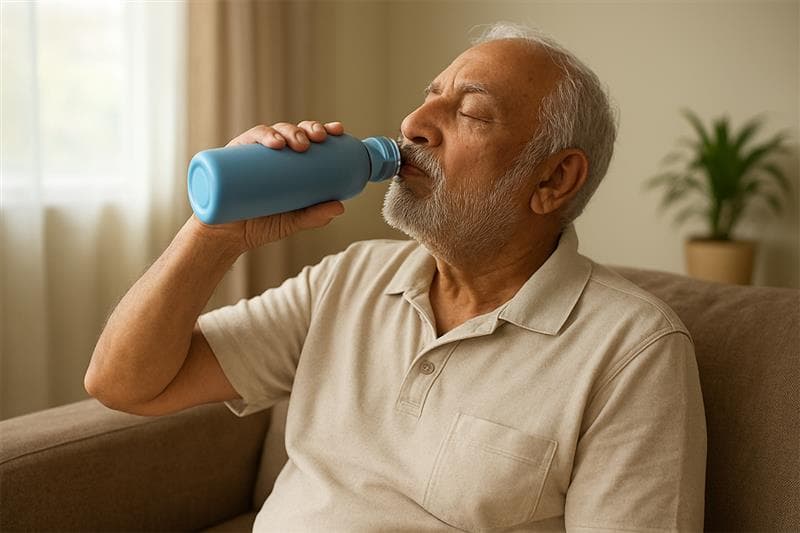
Loading...

Loading...
2025-08-19
Antara
According to various studies, many older adults don't get enough water. This health risk often goes unnoticed, especially when seniors stay active in their later years. Dehydration can make people confused, tired, dizzy and lead to longer hospital stays.

Seniors need specific hydration strategies that work with their body's changes. The American Heart Association points out that each person's water needs are different. Older adults must drink enough water to stay healthy. Men aged 51 & older should aim for 13 cups daily, while women need about 9 cups, according to the National Academy of Medicine. Seniors don't feel thirsty like they used to, so they need to think over their water intake.
This article explains why older adults risk dehydration more easily, what warning signs to watch for, and practical ways to stay hydrated during exercise. Seniors can protect their health and stay active by understanding these simple hydration guidelines, whether they take daily walks or join fitness classes.
Age brings several factors that increase dehydration risk. The body's water content decreases naturally in older adults. On top of that, it becomes harder for ageing kidneys to concentrate urine and keep fluids. The body's thirst signal weakens with age and often triggers later than it should, even when hydration is needed. This explains why older adults tend to drink less water than younger people. Many common senior health conditions like diabetes, atrial fibrillation and kidney disease raise the risk of dehydration. Certain medications such as diuretics and blood pressure treatments can also affect hydration levels.
Early symptoms of dehydration include:
Serious symptoms need immediate medical care - these include rapid heartbeat, movement problems, severe confusion and fainting. It's worth mentioning that people often mistake these signs for normal ageing or other conditions.
The National Academy of Medicine suggests men over 51 should drink about 13 cups (3.7 litres) daily, while women need 9 cups (2.7 litres). A practical rule is to take your body weight, divide it by three, and drink that many ounces of water. Food provides about 20% of your daily fluid needs.
The right timing of fluid intake plays a vital role in keeping active seniors healthy:
Before Exercise: Your body needs 400 to 600 mL of fluids 2 to 3 hours before any activity. This preparation will give a good hydration foundation. Drinks containing sodium might help your body maintain fluid levels better during workouts.
During Exercise: You should drink 400-800 mL every hour while exercising. This means about 100-200 mL (half a cup) every 15 minutes. A water bottle should always be within reach.
After Exercise: Your body needs about 3 cups (710 mL) of water to replace each pound lost during exercise. A quick weigh-in before and after workouts helps track your specific hydration needs.
Water remains the top choice for most seniors. Notwithstanding that, here are some great alternatives:
Active seniors need steady hydration throughout their day, not just while exercising.
At Antara, keeping seniors hydrated takes priority every day. Older adults often don't feel thirsty, so caregivers help by reminding them to drink water. We help them in maintain a daily routine that helps in managing all the necessary things including hydration. They nudge them to sip before heading out for walks, eating meals, or tackling daily tasks. Residents stick to hydration plans tailored to their specific health needs and medications they take. To make this easier, Antara provides flavoured water, soups packed with nutrients, and herbal teas that residents enjoy. Water bottles are always close by, and caregivers motivate them to stay hydrated during workouts and fun activities.
Staying hydrated matters more as people get older. Our body undergo changes over time that make water management tougher for seniors. Older adults face a higher chance of dehydration due to having less body water weaker kidney function, and a lower ability to feel thirsty.
Active seniors should take a proactive stance on hydration instead of waiting for thirst. The right fluid intake before, during, and after physical activity will give a steady energy level and prevent risky symptoms like confusion or dizziness. Checking urine colour is a simple way to track hydration levels throughout the day.
Water remains the best choice for hydration. Flavour-infused options, electrolyte drinks, and nutritious soups can add variety while keeping the body well-fuelled. Making hydration a daily habit—like taking medications or following an exercise routine—will help active seniors enjoy their physical activities safely and comfortably.
Good hydration doesn't just prevent health issues. It actively boosts your quality of life by improving energy, cognitive function, and overall well-being. Small, consistent hydration habits today build the foundation for an active, healthy lifestyle tomorrow.
The National Academy of Medicine suggests 13 cups daily for men and 9 cups for women over 51. You can try a practical method - take one-third of your body weight and drink that number in ounces.
Proper hydration substantially improves physical performance and brain function. Your body temperature regulation becomes harder with age, and staying hydrated helps manage this. Seniors who stay well-hydrated get fewer muscle cramps, have better coordination, and bounce back faster from workouts.
Look out for:
The answer is no. Our thirst sensation weakens with age and kicks in later than it does for younger adults. In fact, many seniors don't feel thirsty until dehydration has already set in.
Water remains your best choice. Milk gives you calcium and other nutrients. Electrolyte-enriched water helps your kidneys function better. You can enjoy herbal teas without caffeine's effects. Remember to limit coffee and alcohol because they increase fluid loss.

Please fill in the form and submit the details to request an appointment.